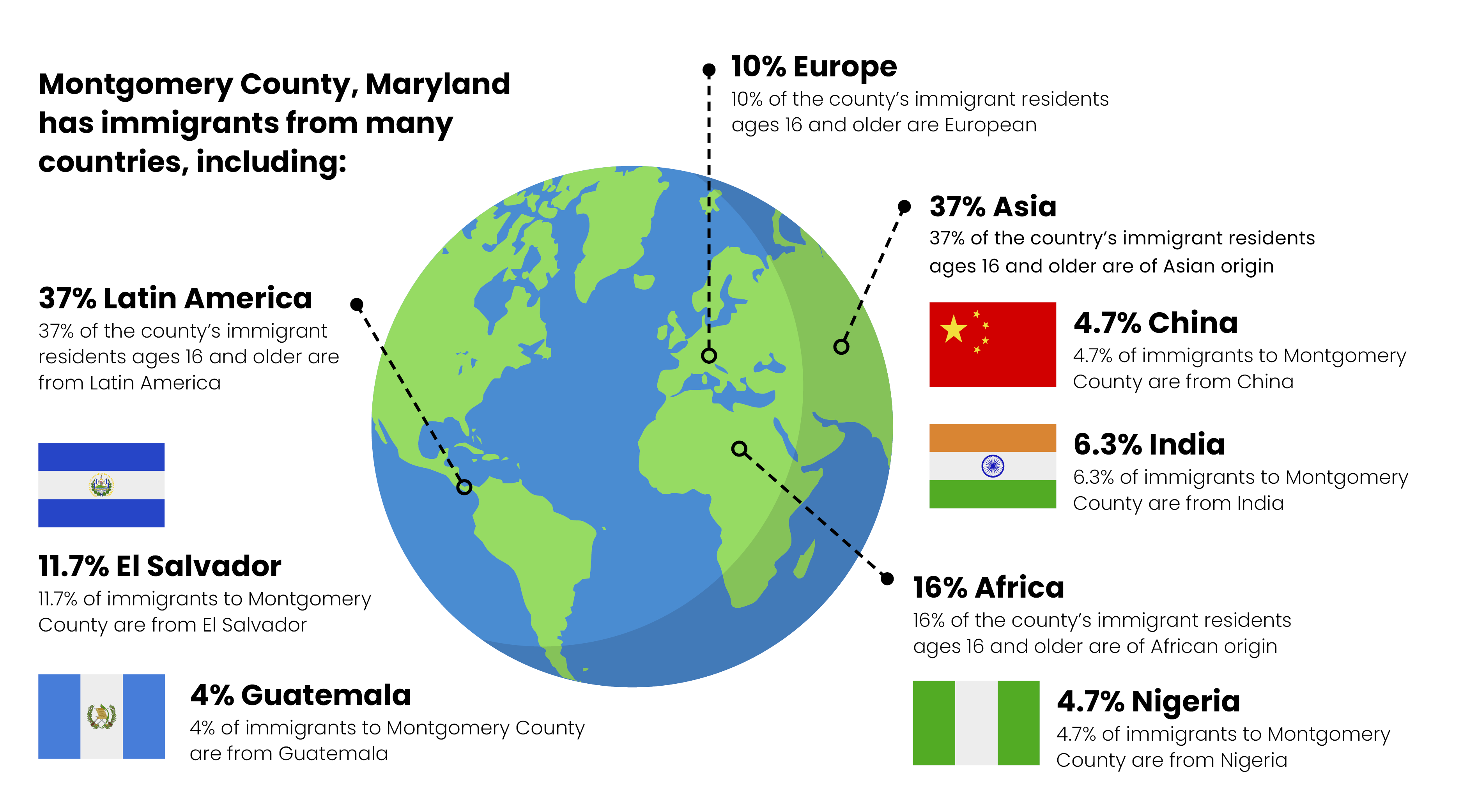 MONTGOMERY COUNTY PUBLIC SCHOOLS
MONTGOMERY COUNTY PUBLIC SCHOOLS
 MONTGOMERY COUNTY PUBLIC SCHOOLS
MONTGOMERY COUNTY PUBLIC SCHOOLS

All children have a right to a public education. Under federal law, all children, regardless of their citizenship or residency status, are entitled to a K-12 education, including college counseling services. School districts that either prohibit or discourage children from enrolling in schools because they or their parents are undocumented immigrants may be in violation of federal law.
According to the United States Census Bureau, during the years of 2019-2023, 33.4% of residents in Montgomery County, MD are originally from countries outside of the United States.

Source: Montgomery County QuickStats

Our schools are and will always remain safe places where every child—regardless of immigration status—is welcomed, valued, affirmed, validated, respected, and loved.
To provide clarity and reassurance, here are some important reminders that reflect our values of safety, inclusion, and respect for every student and family in our community:
Schools are places where students should feel secure, supported, and free to focus on their learning. Federal guidance recognizes schools as sensitive areas, meaning that enforcement actions by immigration authorities are generally not permitted in schools or on school grounds.
Education is a fundamental right, guaranteed to all children regardless of immigration status. The U.S. Constitution and the 1982 Supreme Court ruling in Plyler v. Doe ensure that every child has the opportunity to thrive in a public school setting, emphasizing our commitment to equity and access for all.
Every family deserves respect and privacy. MCPS does not ask about immigration status or report family information to immigration authorities. These practices help create a welcoming environment for all families.
We are committed to fostering a culture of kindness, respect, and safety. MCPS does not tolerate bullying, harassment, or intimidation for any reason, including immigration status. If a student experiences such behavior, they are encouraged to notify a trusted adult, such as a school administrator.
Is there a federal law that prevents schools from sharing student information?
Yes. Under the Family Educational Rights and Privacy Act (FERPA), schools are prohibited, without parental consent, from providing information from a student’s file to federal immigration agents unless they have a subpoena. If ICE agents present a school with a removal warrant (deportation order), school based staff should immediately contact the Office of the General Counsel at (240) 740-5600. The school is still permitted to refrain from providing student information, as the warrant is administrative, not judicial. Under FERPA, schools may disclose directory information without consent, unless the family completed an Annual Notice for Directory Information and Student Privacy at the start of the school year. For more on FERPA, see familypolicy.ed.gov/ferpa-parents-students.
Terminology
It is important that a common understanding exists when considering the complexities of the immigration status of members of the community.
Newcomer Toolkit from OELA, 2023
Chapter 2: Welcoming Newcomers to a Safe, Inclusive, and Thriving School Environment.
This is a great resource from the United States Department of Education. (p21) This chapter highlights actions schools and staff can take to understand, support, and engage students and their families as they join school communities.
AFT - Immigrant and Refugee Children Tools and Resources
NEA Ed Justice
Resources for Immigrant Families- Know Your Rights Immigration & Schools
Purpose: To establish clear procedures for school officials to follow when interacting with ICE agents, aiming to protect student rights and ensure appropriate legal responses.
Underlying Principles:

Step-by-step guidance on what a school principal/designee should do if an Immigration and Customs Enforcement (ICE) officer approaches a school “for any reason.”
Create a Welcoming & Inclusive Environment:
Protect Student Privacy:
Provide Accurate Information:
Advocate for Student Rights:
Build Trust with Immigrant Families:
Create safe spaces for families to share their concerns and seek support.
Inquire about a student's immigration status.
Share student immigration information with anyone who is not authorized to have it.
Use dehumanizing or discriminatory language.
Engage in speculation or gossip about a student's immigration status.
Discriminate against students or families based on their immigration status.
Allow fear-mongering or the spread of misinformation about immigration.
Become involved in immigration enforcement activities.
Make false promises to students, families or caregivers.
Make assumptions about the status of bilingual/multilingual students/ families.